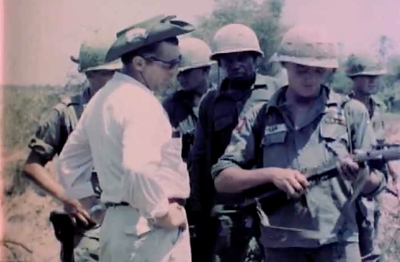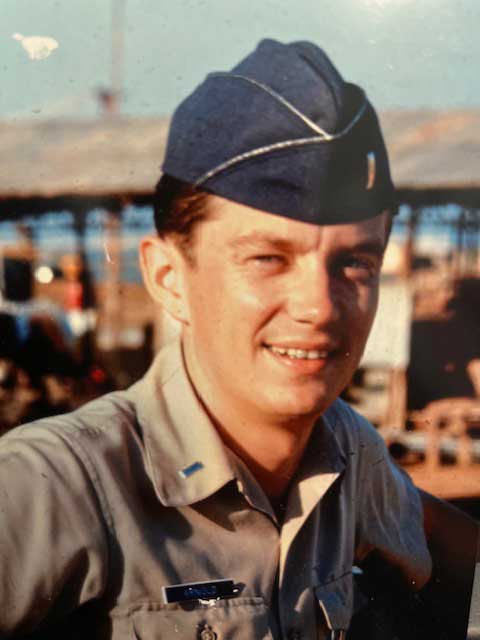A Hollywood Bad Boy, a Near Brawl, and the Wild Blue Yonder Of all the scenarios I’d imagined when I joined the Air Force in 1962, preventing bloodshed between Robert Mitchum and a master sergeant wasn’t one of them.
In Vietnam—as in most wars with American involvement—singers, comedians, and bands often traveled to war zones to entertain the troops. These included performers from The Bob Hope Show, the multitalented Danny Kaye, and broadcaster and entertainer Arthur Godfrey.
As an information officer at Korat Royal Thai Air Force Base, Thailand, in 1966, I often greeted and helped escort such VIPs.
These visits were almost always without incident. Almost.
Robert Mitchum—who’d served briefly in the Army during World War II as he rose to fame in Hollywood—arrived at Korat right on time via Army aircraft during one of two visits to Southeast Asia as part of a USO tour. Mitchum had been nominated for an Academy Award for best supporting actor for the 1945 film The Story of G.I. Joe and later played a Navy captain in The Winds of War miniseries. He’d also had a few brushes with the law, including an arrest for marijuana possession that earned him 43 days on a prison farm in California.
At Korat, Mitchum wore his usual open shirt and trousers, which highlighted his physique and past-prime handsome good looks.

Screengrab from film footage of Robert Mitchum meeting with troops in Vietnam. (United Stock Footage, courtesy of Shutterstock)
Base leadership did not show up to greet him, leaving only myself and a photographer to welcome him. This was unusual.
As I moved toward the aircraft that carried our VIP, a blue Air Force vehicle driven by the base’s vice commander came out of nowhere and screeched to a halt. I figured combat wing leaders must have more important situations to manage.
The vice commander rushed to the aircraft, hurriedly welcomed Mitchum and his escort officer, and ushered them into the car’s back seat. He then ran to the driver’s side, jumped behind the wheel, and began to leave the area. After a few feet, the car made an abrupt stop.
The vice commander lowered his side window and yelled, “Arnold, come with us!”
I slid into the front seat, turned to the rear, and introduced myself.
“Hi, I’m Lt. Terry Arnold.”
Mitchum responded with a handshake. “Bob Mitchum,” he said.
I told him we were happy to see him at our base. Our driver, who called him “Mr. Meechim,” briefly explained Korat’s mission—throughout the war, most air strikes over North Vietnam originated from Thailand.

Terry Arnold has many stories from his year in Southeast Asia, but meeting Robert Mitchum—and helping break up a fight—is among his favorites. (Photo courtesy of the author)
Our first stop was the enlisted mess hall, where we ate lunch with the troops. Mitchum spoke with the airmen and took photos with them—what we’d call selfies today.
So far, so good.
We next stopped for a visit at the Non-Commissioned Officers Club, which operated 24 hours a day due to the round-the-clock base mission. As we entered the club and headed into the darkness of the bar, I noticed a grizzled master sergeant who I felt fairly certain had been there for some time.
“Why, Bob Mitchum, you old narcotic!” shouted the master sergeant.
With that greeting, things took a nasty turn.
Mitchum lunged toward the man, getting nose-to-nose with him while pushing him backward.
The vice commander, the escort, and I lunged toward them and struggled to pull them apart.
Once Mitchum and the master sergeant were separated, the tension seemed to ease. The two men leaned in close, talking in low voices. We couldn’t make out what they were saying, but it must have been friendly. Both men turned to the bartender and ordered drinks.
After a couple of stiff ones, I wasn’t sure we could get Mitchum back into the car for this next stop at the Officer’s Club. But we managed.
The meeting with the officers went well—no more near-brawls. We delivered the actor and his escort back to their aircraft for the next leg of Mitchum’s visit, which, according to Robert Mitchum: “Baby, I Don’t Care,” a biography of the actor by Lee Server, included signing autographs, visiting the wounded, and collecting messages to deliver to troops’ families back home.
As we say in the Air Force, they were off into the wild blue yonder.
I later learned why the wing’s senior staff had not greeted or escorted Mitchum. They didn’t want to be associated with a Hollywood “bad boy.” Long before Mitchum had spent time on a prison farm for marijuana possession, he’d served on a chain gang for vagrancy, and he had a reputation for getting into fights.
Nearly six decades have passed since my year in Southeast Asia, and though I recall many stories from that time, this one is among my favorites—I have told it many times to anyone who would listen. I helped prevent bloodshed between one of my favorite actors and an inebriated master sergeant—although I imagine it was the latter whom we actually spared.
Of all the scenarios I imagined when I joined the Air Force hoping to become not an information officer but a fighter pilot as things were heating up in Vietnam, this certainly wasn’t one of them.
It was, as I like to say, the extent of my combat experience.
This War Horse reflection was written by Terry Arnold, edited by Kristin Davis, fact-checked by Jess Rohan, and copy-edited by Mitchell Hansen-Dewar. Abbie Bennett wrote the headlines.
The War Horse




Comments are closed.